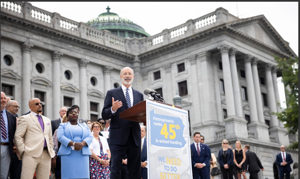Democrats in Pennsylvania see ‘unprecedented’ solution to education funding woes

(The Center Square) – Pennsylvania lawmakers say a $10 billion combination of cash flow and federal stimulus means the state can pour money into public education on an unrivaled scale – all without raising taxes.
Democrats, buoyed by outgoing Gov. Tom Wolf, said Tuesday that “now is the time” to use the money – a roughly $3 billion revenue surplus and $7.3 billion in federal stimulus – to remediate toxic schools and redistribute state education funding in a more equitable way.
“I think we are spending a good deal of money on public education … but I don’t think there is any disagreement that we are not distributing that money equitably,” Wolf said Tuesday. “This is something we cannot go cheap on.”
Pennsylvania spent $6.2 billion on basic education in the current fiscal year, though 89% of that money is doled out to districts based on student population levels frozen in 1992. The remaining slice, about $700 million, funnels through a weighted formula adopted by the legislature in 2016 that also considers a district’s social and economic constraints.
The Legislature follows the bifurcated funding method to shield districts from disparate and steep budget cuts that would occur if the entirety of the state’s education spending funneled through the newer formula.
But the unexpected windfall of federal COVID-19 stimulus and sales tax revenue opens a window of opportunity, Democrats say, to make those districts “whole.”
“We no longer have to make that false choice about who we are going to leave behind,” said Appropriations Committee Minority Chairman Matt Bradford, D-Norristown, during a news conference with Wolf and other Democratic leaders. “With $3 billion in additional revenues, we can finally make a true investment in equity without raising taxes.”
The messaging pivots away from Wolf’s original call to raise personal income taxes on the state’s top third of earners to fund additional education spending. The governor told reporters Tuesday he no longer thinks the hike is “necessary, at this point.”
Though he admitted it will be up the Legislature – long after his term expires in 2022 – to figure out how to maintain funding levels after the stimulus is spent.
“How they work on this down the road, they are going to have to figure that out,” Wolf said, noting the Legislature “plugs holes” every year.
“This is no different,” he added. “We have the money, so let’s fund this.”
Republican leaders have expressed little interest in boosting spending, preferring instead to pay off debt and bolster the state’s rainy day fund for an impending fiscal cliff that could exceed $8 billion.
The majority party also coalesced behind a measure on Monday that raises caps on two educational tax credit programs by $180 million, collectively. The programs give tax breaks to businesses in exchange for donations that fund tuition for students seeking an education outside of their assigned district.
Democrats panned the legislation as a corporate handout and said a provision that raises the caps 25% annually would grow the programs from $400 million to nearly $1 billion over the next five years.
Wolf didn’t have much to say about the bill when questioned on Tuesday.
“This proposal stands on its own,” he said. “This ought to be funded.”
Disclaimer: This content is distributed by The Center Square
